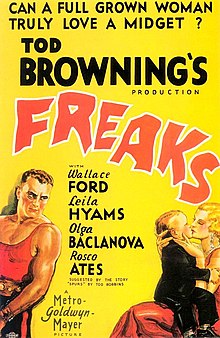
Horror films have frequently featured disability, dating to the genre's earliest origins in the 1930s. Various disabilities have been used in the genre to create or augment horror in audiences,[2] which has attracted commentary from some critics and disability activists.
Monsters and villains depicted in many horror films have often had physical or mental disabilities. These evolved from being sympathetic depictions of disabled characters in early monster films such as Frankenstein, to presentations of disabled people as "bloodthirsty and terrifying" in slasher films of the 1970s and 1980s.[3] Horror films have sometimes attracted criticism for their depictions of disability[3][4][5] or have been described as ableist.[6] Some films have been accused of reflecting eugenicist views held by the society of their time.[7][1] Tropes of characters "overcoming" disability, or of disability granting special powers, have been described as harmful.[8]
- ^ a b Cite error: The named reference
Lopez-2020was invoked but never defined (see the help page). - ^ Hall, Melinda (8 March 2016). "Horrible Heroes: Liberating Alternative Visions of Disability in Horror". Disability Studies Quarterly. 36 (1). doi:10.18061/dsq.v36i1.3258. ISSN 2159-8371.
- ^ a b Lopez, Kristen (26 March 2021). "A Brief History Of Disability In Horror". FANGORIA. Retrieved 30 September 2022.
- ^ Alexiou, Gus (25 November 2020). "Hollywood Must Stop Using Disability Imagery Purely For Horror And Cheap Thrills". Forbes. Retrieved 30 September 2022.
- ^ Buckley, Cara (17 November 2020). "Scary Is How You Act, Not Look, Disability Advocates Tell Filmmakers". The New York Times. ISSN 0362-4331. Retrieved 30 September 2022.
- ^ Garcia, S. (29 October 2018). "Villainizing Bodies and Minds: Ableism in Horror Movies". FEM Magazine. Retrieved 30 September 2022.
- ^ Madden, Emma (10 July 2019). "Midsommar's ableism resurrects the dark history of eugenics-inspired horror". The Guardian. Retrieved 30 September 2022.
- ^ Stine, Alison (16 November 2021). "Some horror movies take a new approach to disability: Fetishizing deafness". Perspective. Washington Post. ISSN 0190-8286. Retrieved 30 September 2022.
